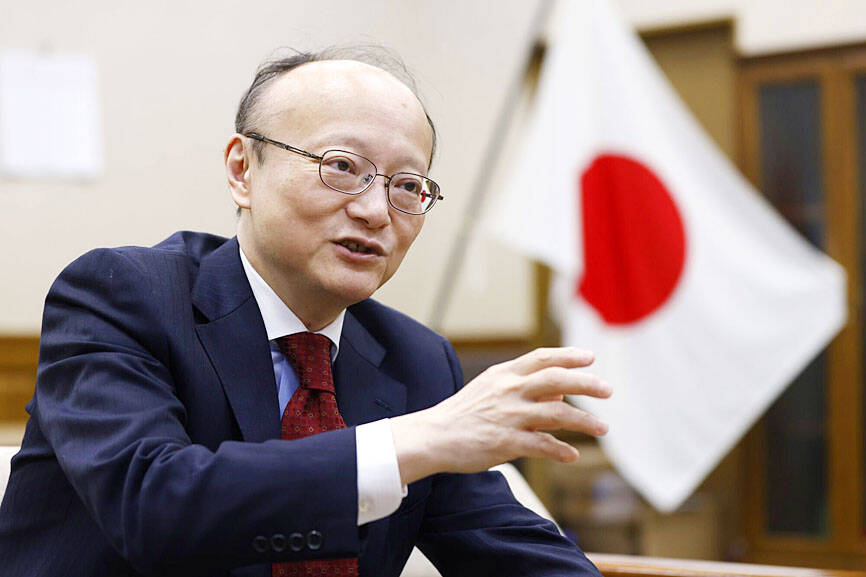Japan’s top currency official said that recent yen weakness is odd and out of line with current economic fundamentals, reaffirming his commitment to act if needed to prevent excessive swings in the exchange rate.
“I strongly feel the recent sharp depreciation of the yen is unusual, given fundamentals such as the inflation trend and outlook, as well as the direction of monetary policy and yields in Japan and the US,” Japanese Vice Minister for International Affairs Masato Kanda said in an interview yesterday. “Many people think the yen is now moving in the opposite direction of where it should be going.”
Kanda’s remarks come amid intense market scrutiny over whether the government would step into the currency market to stem recent falls in the yen, following the Bank of Japan’s decision last week to raise interest rates for the first time since 2007. The currency slid to a 34-year low of ¥151.97 per US dollar on Wednesday, prompting Japanese Minister of Finance Shunichi Suzuki to increase verbal warnings, strongly hinting that Japan could intervene.

Photo: Bloomberg
Finance authorities also convened a three-way meeting, a gathering often used to show heightened concern among policymakers over market movements.
“We are currently monitoring developments in the foreign exchange market with a high sense of urgency,” Kanda said. “We will take appropriate measures against excessive foreign exchange moves without ruling out any options.”
Kanda reiterated the view that Japan is not guarding specific exchange rate levels, but is looking at the direction and speed of movements when assessing developments in the currency market, echoing Suzuki’s comments.
Japan had no defense line on exchange rates, Suzuki said when asked whether the ¥152 mark against the US dollar was a line in the sand.
Tokyo’s biggest intervention splurge was in 2022, after the yen approached 152, though the slide in that direction was much more rapid than currently seen.
Market participants try to gauge the proximity to possible market intervention from the language used by authorities.
“I am just saying what I think is right at the time,” Kanda said, referring to his choice of words.
Behind the yen’s weakness is the view among market players that the difference in policy rate and yields between Japan and its peers, including the US, would remain wide for some time.
Bank of Japan Governor Kazuo Ueda pledged to maintain an accommodative environment when the bank decided to raise its benchmark interest rate last week — ending the world’s last negative rate — pouring cold water on expectations that the bank would soon consider a second hike.
He favors a gradual process toward normalization, but keeping policy easy is not inconsistent with another rate hike, Bank of Japan board member Naoki Tamura said.
The Bank of Japan’s decision was a milestone that showed a virtuous price-wage cycle was in place, with sustainable inflation in sight, Kanda said, adding that strong wage gains during this year’s annual wage negotiations and record spending by companies were positive signs for Japan’s economy.
“Finally we are in an economic situation that enables the Bank of Japan to begin normalization,” Kanda said. “We have come a long way.”

Vincent Wei led fellow Singaporean farmers around an empty Malaysian plot, laying out plans for a greenhouse and rows of leafy vegetables. What he pitched was not just space for crops, but a lifeline for growers struggling to make ends meet in a city-state with high prices and little vacant land. The future agriculture hub is part of a joint special economic zone launched last year by the two neighbors, expected to cost US$123 million and produce 10,000 tonnes of fresh produce annually. It is attracting Singaporean farmers with promises of cheaper land, labor and energy just over the border.

US actor Matthew McConaughey has filed recordings of his image and voice with US patent authorities to protect them from unauthorized usage by artificial intelligence (AI) platforms, a representative said earlier this week. Several video clips and audio recordings were registered by the commercial arm of the Just Keep Livin’ Foundation, a non-profit created by the Oscar-winning actor and his wife, Camila, according to the US Patent and Trademark Office database. Many artists are increasingly concerned about the uncontrolled use of their image via generative AI since the rollout of ChatGPT and other AI-powered tools. Several US states have adopted

KEEPING UP: The acquisition of a cleanroom in Taiwan would enable Micron to increase production in a market where demand continues to outpace supply, a Micron official said Micron Technology Inc has signed a letter of intent to buy a fabrication site in Taiwan from Powerchip Semiconductor Manufacturing Corp (力積電) for US$1.8 billion to expand its production of memory chips. Micron would take control of the P5 site in Miaoli County’s Tongluo Township (銅鑼) and plans to ramp up DRAM production in phases after the transaction closes in the second quarter, the company said in a statement on Saturday. The acquisition includes an existing 12 inch fab cleanroom of 27,871m2 and would further position Micron to address growing global demand for memory solutions, the company said. Micron expects the transaction to

A proposed billionaires’ tax in California has ignited a political uproar in Silicon Valley, with tech titans threatening to leave the state while California Governor Gavin Newsom of the Democratic Party maneuvers to defeat a levy that he fears would lead to an exodus of wealth. A technology mecca, California has more billionaires than any other US state — a few hundred, by some estimates. About half its personal income tax revenue, a financial backbone in the nearly US$350 billion budget, comes from the top 1 percent of earners. A large healthcare union is attempting to place a proposal before